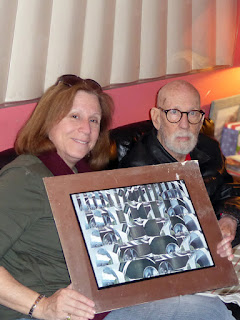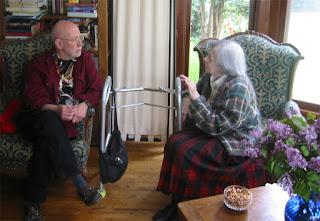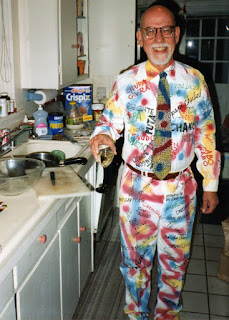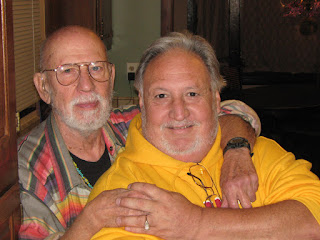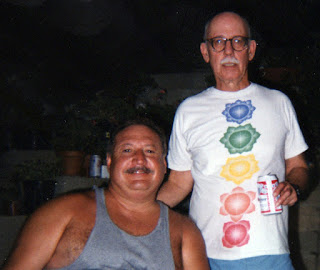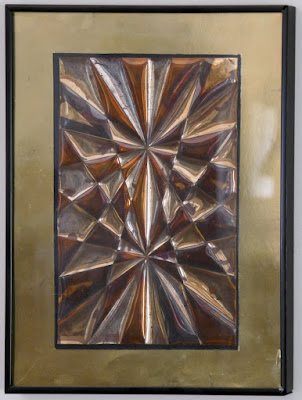Anyway, in this one, now clean, closet (there are many others that need cleaning and plenty of drawers to boot), I found the tubes I often used to perform a solo clarinet piece entitled B,a,b,b,it,t by composer Donald Martino. Written as a birthday present for his teacher, Milton Babbit, it is as much performance art as it is tuneless pointillistic atonality.
B,a,b,b,it,t requires "tubes" - also called "extensions" - which are to be periodically stuck into the end of the clarinet, extending the length of the instrument and thus creating pitches below the normal range. Once the tube has served its purpose it is pulled out of the clarinet and unceremoniously dropped on the floor.
I made my set of tubes from rolled-up cardboard and masking tape when I was a graduate student sometime between 1974 and 1976. I had enough extra cardboard to make a carrying tube for them.
I gave up playing the clarinet in the nineties. I stuck these B,a,b,b,it,t tubes, case and all, into the very closet where I found them last week. Years had not been kind to them. The masking tape had become dry and cracked. Some of the tubes had been crushed. The case was falling apart. Briefly I wondered whether I could bequeath the set to some weird young clarinetist somewhere. Don't be silly, I told myself. Their uselessness was obvious.
I knew what I must do. I had to throw them away.
But hold on . . . before I did that . . . I decided to take a picture of them. This would soften the blow of tossing a sentimental useless artifact of my long gone personal musical history into the trash. And I continued, (trying to soften the blow even more) I could write about this on Mixed Meters and post the picture and maybe thereby repurpose my damned old blog for which my interest has been waning. Mixed Meters could become an archive of discarded relics of interest only to myself. (This is not a completely new idea.)
Here's the picture of my tubes.
But hold on . . . maybe I could take it one step farther . . . why not add a recording of myself playing B,a,b,b,it,t? It took me a while to locate and then a second while to digitize. In this day and age you probably expect a video. Alas, I gave up performing long before videos were just one click away.
Here's my audio version:
Listen to Donald Martino, B,a,b,b,it,t for clarinet with extensions, performed by David Ocker, clarinet - June 29, 1980 at I.D.E.A. Studio, Santa Monica CA - 241 seconds
This performance was part of a solo clarinet recital, something I did a handful of times throughout my 20-year clarinet "career". While I was at it I digitized the whole concert. Not nearly so wince-inducing as I feared, although I was having my problems that night. Here's another piece from the same concert:
Listen to J.S. Bach, Chromatic Fantasy, arranged for solo clarinet by Gustave Langenus, performed by David Ocker, clarinet - June 29, 1980 at I.D.E.A. Studio, Santa Monica, CA - 369 seconds
But hold on . . . there was still more . . . my recital was reviewed by the Los Angeles Times. Pretty damn amazing that the largest Southern California newspaper, back in the days when newspapers were actually important, would pay a music critic to visit a struggling second-floor dance studio above a Radio Shack to hear an unknown clarinetist play abstruse contemporary music without any accompaniment. (Well, there was one piece where my friend Jimmy Hildebrandt played drums.)
And it was a good review overall. So I modestly offer it, if you're curious.
Click on any picture to enlargen it.
But hold on . . . and this is the last time for holding on, I promise . . . there's an important personal issue to be dealt with here, one I'm having difficulty with.
What am I going to do with all this stuff? Remember all those closets and drawers I mentioned? There are a lot more memory laden items where those tubes came from.
There are my Mother's old family photo albums and piano music. My 5-year old hand immortalized in chipped gold-painted plaster. Tapes of my bar mitzvah, my high school band concerts, almost every one of my college recitals and a 24-hour environmental recording made outside my apartment just two blocks from the Hollywood freeway, starting at noon on December 31, 1979 (it was source material for a tape piece). Pretty much every copy of every piece of music I've ever written and every recording ever made of them and every abstract drawing I've ever made and a sheaf of blackened manuscript paper with tens of thousands of random black scratches (from testing my ink pen before there were music notation programs). There are boxes of old computer disks, programs plus useless data, together with the printed manuals along with the hard drives from every computer I've owned for over 20 years. I'm guessing those drives have lots of important digital stuff I can't bear to part with on them as well. There are old films (see below), videos, reel-to-reel tapes galore, and cassettes and CDs up the wazoo. Old music programs, press releases, reviews (some of which only mention my name in passing) and printouts of downloaded articles I read once and thought I might want to return to. Pretty much every book I've ever owned - many of which are still in boxes in the basement, unpacked since our last move 21 years ago.
I've hoarded all of this (and more) with the vague plan that I'd do something with it someday. Most of it has memories - my memories. I labor under the delusion that holding onto my memories is important. I want to remember these things and I know my memory isn't what it used to be. My brain, you know.
I'm ambivalent about spending a big chunk of my present life dealing with all these things. It wasn't that great of a past - although it was okay, I guess. I'm old enough now to know that I don't have forever yet to go. In my best moods I still hope for two decades yet, but one never knows. Cataloging all this crap is probably not a good use of my energies or my time. If I can't bring myself to toss all of it, at least I can apologize to whomever will have do the tossing when I'm gone.
I saved it all for a reason - it was once meaningful to me. I wouldn't have taken the picture of the tubes if they still had absolutely no value. And, as long as there's an Internet, I'll be able to refresh my memory of them and of how hard they were to toss out.
Here's a short music video I did to an early home movie. I was not quite 2 years old.
And here's the Times' review, in text instead of picture, so Google will find it the next time someone searches for Dark as a Dungeon by Christian Wolff.
Ocker in Solo Clarinet Recital
by John Henken
July 1, 1980
Los Angeles Times
A solo clarinet recital would seem to promise a surfeit of unadorned tootling. But Sunday evening at the I.D.E.A. Studio in Santa Monica raconteur and clarinetist David Ocker carried it off nicely: a loose, intriguing program done with wit, spirit and abundant technical glitter.
Ocker opened vigorously with Stravinsky's Three Pieces (1919). Succinct, jazzy and with ample interpretive leeway, they represented a prevailing current. Donald Martino's "A Set for Clarinet" (1954) is certainly in much the same mold, though more dependent on literal jazz formulations. It was Ocker's interpretive stance, however, that provided the most common ground. Both brash and beguiling, he played with marvelous fluency and expressive nuance.
It was the performance also that pulled through Robert Jacobs' "Inner Light" (1979), a piece with all the potential of "Bolero" for popular abuse. With percussionist James Hildebrandt, Ocker kept the relentless rhythmic drive purposeful, the bluesy theme passionate but not unduly primitive.
After watching a man hold a black stick in h is mouth for a while, a air of surrealism can grip the watcher. In "Several Unrelated Events" (1976) by John Steinmetz, this musical Dada effect becomes tangible. Fortunately, Ocker is an actor with a nice sense of timing and "Events" emerged with humor and sparkle.
Martino's "B,A,B,B,IT,T" (1966), a musical birthday card for composer Milton Babbitt, exploits some improbable sounds produced by inserting paper tubes into the bell-less bore of the instrument. Martin probably had more in mind, but Sunday, funny noises sufficed.
Also on the program was an arrangement of Bach's "Chromatic" Fantasy (stunning) and Fugue (ho-hum, with multiple Ockers on tape), and Christian Wolff's "Dark as a Dungeon" (1977), a mild exercise in pitch manipulation, particularly octave displacement. Ocker served both well.
This extraordinary clarinetist also provided verbal annotation for the program. "Mo's Vacation" (1978) by Frank Zappa made a nice story, but the piece proved to be routine atonal wandering, punctuated by Casbah riffs.























